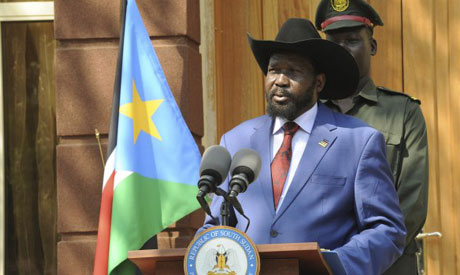
South Sudan's President Salva Kiir gives a press statement on his reasons for rejecting a African Union-brokered deal to resolve its oil crisis with its northern neighbour, in Juba February 2, 2012. (Photo:Reuters)
The president of South Sudan warned Thursday of renewed conflict with former foes in north Sudan if bitter oil negotiations do not include a deal on other key issues, including the contested Abyei region.
"It would not be fair to my people to support an agreement that invites more conflict by failing to resolve underlying issues," Salva Kiir told reporters.
"An agreement that we would consider signing should not only focus on the oil crisis, but be comprehensive to cover all the outstanding issues," he added.
South Sudan in January took the extreme step of shutting down oil production -- the fledgling nation's top revenue source -- as it accused rival north Sudan over an oil dispute and African Union-mediated talks remain stalled.
Kiir said he had rejected an offer made last week because it failed to address the future of the contested Abyei region, an area the size of Lebanon which is claimed by both sides but occupied by Khartoum.
"The (proposed) agreement would guarantee future -- and possibly immediate -- conflict over land, people and oil," Kiir said.
UN chief Ban Ki-moon said Sunday that tensions and a furious row over oil between the former enemies has become a major threat to regional peace and security.
Juba rejected a draft agreement proposing the oil-rich but grossly underdeveloped South give Khartoum $5.4 billion (4.1 billion euros), to be paid by Sudan's taking of 35,000 barrels of oil per day.
"It is difficult for me to accept a deal that leaves our people vulnerable, dependent and paying billions that they do not owe," Kiir said, adding that Juba wanted to ensure the fledgling nation's economic independence.
"We reject that assumption that mutual dependency of our two nations is the path to peace. It is not. Dependency only brought us continued confrontation and human suffering. This cycle must be broken," he said.
South Sudan split from Sudan in July, taking with it three-quarters of the country's oil, but all pipeline and export facilities are controlled by Sudan.
Khartoum has said that Juba had not paid it for using its pipelines and refinery since South Sudan seceded in July, and admits to have confiscated 1.7 million barrels of South Sudan crude.
Tensions have also been raised by their still undemarcated border, parts of which cut through oil fields, as well as mutual allegations that each side backs proxy rebel forces against the other.
Both countries depend on oil income for a key part of their struggling economies, and oil makes up over 90 per cent of South Sudan's revenue.
Kiir said South Sudan was taking "austerity measures to ensure the continued viability of our nation" following the production shutdown.
"These measures will not be easy, however, they are necessary as we will need to close the gap created from a loss of oil revenue," he said, urging people to accept a "temporary sacrifice for the overall good" of the country.
The two sides are due to hold fresh rounds of talks on 10 February in the Ethiopian capital Addis Ababa.
Short link: